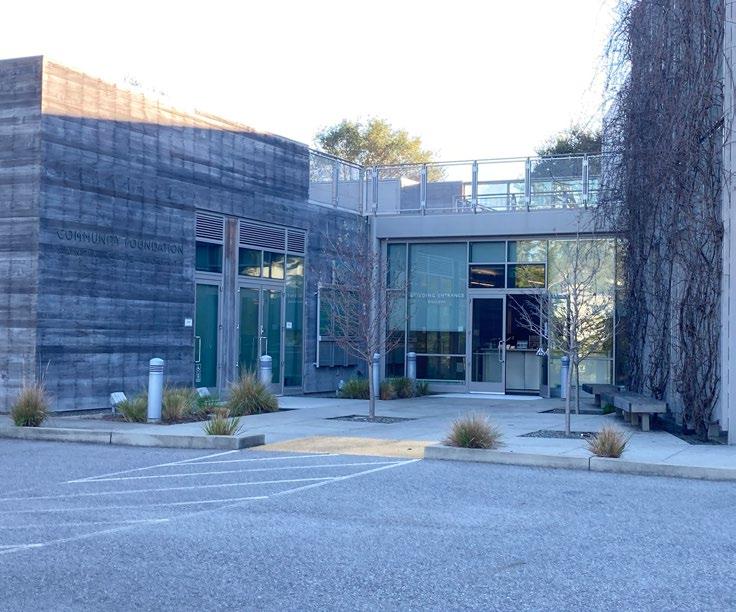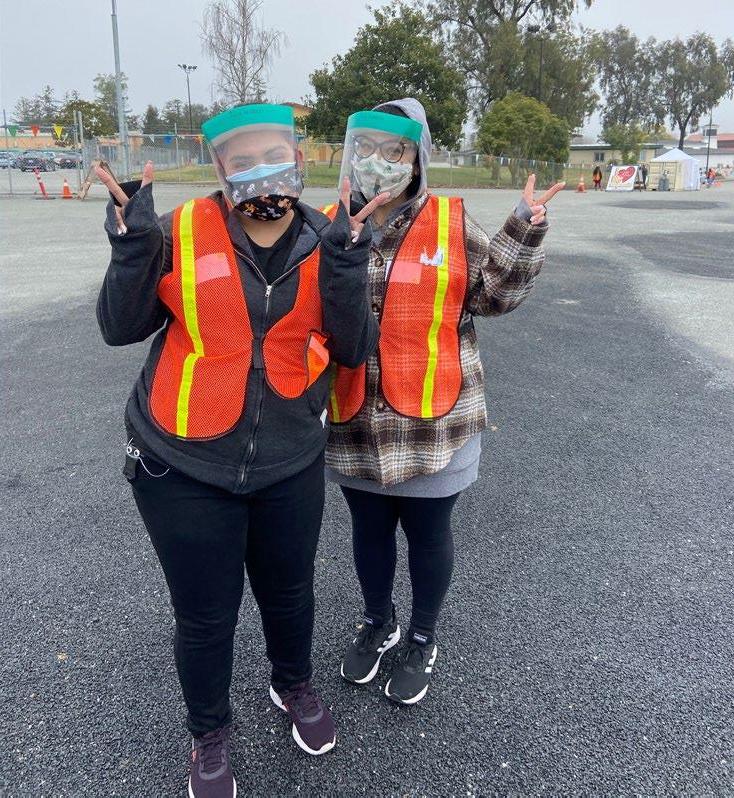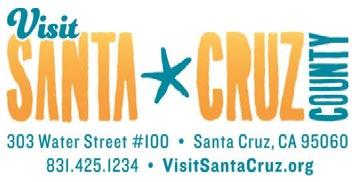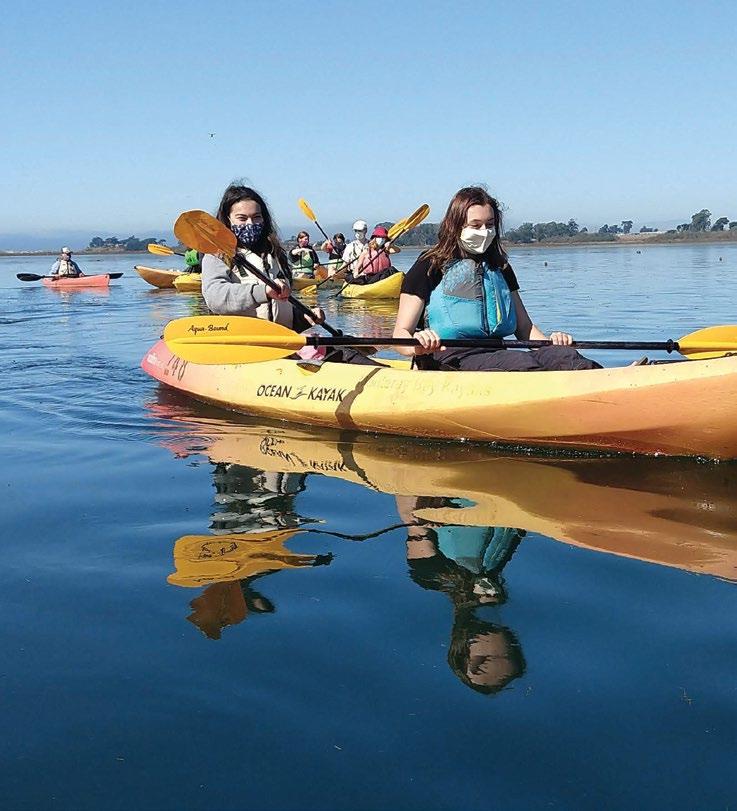
11 minute read
Foundation Details Grant Process
COMMUNITY NEWS Foundation Details Grant Process
In 2021, Community Foundation Santa Cruz County will award community grant requests by invitation only. Invited organizations will be asked to submit a simple request form by March 15.
Advertisement
The foundation expects to grant more than $2 million from its discretionary grant-making funds. Donors direct more than 80% of all the grants the foundation awards to the causes they care about most.
The majority of these funds are restricted to benefit children, youth, and seniors, and are focused on education, end of life care, youth development, historic preservation, and human services.
Proposals will be reviewed in March with a staff recommendation going to the board for final approval April 1.
Asked why by invitation only, the foundation’s answer is, “We’re focusing on the relationships we’re building with current grant partners and look to support their organizational health. We have a high grant renewal rate, which leaves little room for new partners.”
Last year, grants were awarded to 35 organizations from Watsonville to San Lorenzo Valley.
Many organizations the foundation anticipates not being able to fund, and in that case, the foundation welcomes you to submit an “Impact Profile.”
These succinct profiles of your work allow foundation staff the opportunity to introduce donors to the work you’re doing with optimism it will yield new attention, understanding, and resources toward your organization. Impact Profile forms will be available online starting March 26 and will be accepted on a rolling basis.
For those seeking help with the profile, a recording with writing and editing tips will be posted at cfscc.org.
The foundation anticipates providing grants from the Fire Recovery and COVID Response Funds by invitation only. Contact grants@cfscc.org to see if your work may be eligible for funds dedicated to supporting people’s recovery from the impacts of the pandemic and/or helping the land and people to heal from the CZU fires. n
•••
For details see cfscc.org or the frequently asked questions page https://docs.google.com/ document/d/1Yk8PHhMAyte874AC0ttW 2rqstD3Tu0zVbO9eKqna80Q/edit If your question isn’t answered, email grants@cfscc. org or Kevin Heuer, Director of Engagement & Impact at kheuer@cfscc.org



COMMUNITY NEWS Volunteers Help Fight COVID Pandemic
The Volunteer Center of Santa Cruz County has been part of the community fabric for more than 50 years.
While so much has changed since opening their doors in 1967, the heart of what they do has remained the same. They are about what happens when hopeful people work together to transform our community for good.
Each year they collaborate with more than 20,000 community members, nonprofits, and local businesses to invest time and resources into building a more connected community through volunteerism.
In their history, they have proudly stood alongside the community to mobilize volunteers through times of prosperity and through historic challenges like earthquakes, floods, fires, recessions, and now a pandemic.
“While the last year has presented incredible upheaval for our community, never have we been more proud to work in partnership with our neighbors to meet local need,” said Christine Loewe, Volunteer Center of Santa Cruz County director of communications.
“Despite the pandemic, we have remained committed to finding safe ways to maintain connections and engage volunteers,” she added. “In 2020, we linked a record number of volunteers and donors to our community. If we have learned anything from the last year, it is that community connections are vital to our sense of hope, people will not be deterred from doing good, and the spirit of giving in Santa Cruz County cannot be diminished.”
Overall, more than 10,000 volunteers helped in 2020 through mask making, grocery shopping for vulnerable seniors, staffing emergency shelters, distributing free food, online tutoring, disseminating emergency preparedness information, holiday giving and more.
“Due to the incredible generosity displayed by our community, we launched into 2021 feeling optimistic about our ability to maintain momentum and continue meeting community needs by supporting safe ways for volunteer action,” said Christina Thurston, Volunteer Center director of volunteer engagement.
After partnering with the County and City of Santa Cruz last summer to connect nearly 2,000 volunteers with fire recovery support, the Volunteer Center kicked off the year by renewing their partnership with the County to enlist volunteers to support vaccine clinics. Nearly 300 people have stepped up thus far to offer support at local clinics throughout the county.
“This will be an ongoing effort in the coming months and we are looking to grow our volunteer registry of non-medical volunteers to support this work,” Thurston said. “Currently, we are recruiting volunteers to support the mass vaccination clinics at the Watsonville Fairgrounds. As more vaccinate clinic locations open when additional vaccines become available, we will develop volunteer shifts to continue to support this effort.”
Vaccine clinic volunteers help with greeting patients, helping them fill out forms, traffic control, acting as a runner, and checking in on patients in the waiting area. Community members are invited to learn more about this role and register to help by visiting the Volunteer Center website at https://scvolunteercenter.org/ events-2/vaccine-clinic-volunteers/
This month the Volunteer Center as part of the statewide Listos California Campaign, will work with community partners to disseminate information about vaccine safety and how to access the vaccine. Listos means prepare
“Our goal as a Listos partner is to ensure that every member of our community has the information and access they need, particularly our most vulnerable populations,” Thurston said. “We know that some community members have anxiety about getting the vaccine, are not sure where to get it, don’t know when their turn will be, or how to find further information and we want to alleviate any of the barriers that may prevent folks from getting vaccinated. By engaging community members to volunteer or learn more about vaccine safety, we can fight the impacts of this pandemic and ensure that no one gets left out of the process.” n


Two volunteers help with the initial greeting of arrivals at the Watsonville Fairgrounds COVID-10 vaccine clinic.
•••
Partner with the Volunteer Center of Santa Cruz County: Learn more about the Volunteer Center, Vaccine Clinic volunteering, and their family of 20 programs by visiting www.scvolunteercenter.org.
Reach Out: 831-427-5070 or email volunteer@scvolunteercenter.org
Sustain our Programs: https://scvolunteercenter.org/sustain-our-efforts/
Visit Santa Cruz County Seeks Nominations
Visit Santa Cruz County is accepting nominations for its 25-member Board of Directors. The deadline to submit nomination forms is Tuesday, March 16.
The board has representatives from regions of the county, 13 lodging seats and a cross-section of representatives of businesses, cultural, governmental and organizations with affiliation to the travel and tourism industry. Responsibilities include participation in governance of the organization, advocacy for the tourism industry, and active participation at board meetings six times per year. Board terms are two years and begin July 1.
The Nominating Task Force will review all nominees. For a nominating form, visit https://www.santacruz.org/wp-content/ uploads/2021/02/2021-Board-Nominating-Form-Application-fillable.pdf n •••
For information, email dharris@santacruz.

COMMUNITY NEWS $17 Million in Rent Aid Coming
By Jondi Gumz
By March 15, Santa Cruz County expects to have a new rent and utility relief program to stave off pandemic evictions, targeting low-income tenants and their landlords, funded with $16.9 million in state and federal money.
Details on how renters can apply will be posted at HousingIsKey.com and dre.ca.gov.
As of December, nearly 17,000 people in Santa Cruz County had lost jobs due to the pandemic, cutting off income vital to pay for food, rent and utilities. That’s the most recent number; January statistics won’t be posted until March 12.
County supervisors approved the program Tuesday.
The county could have created its own unique program to administer federal rent relief but then would not have been eligible for state funds. With little time to make arrangements, participating in the state rent relief program made the most sense.
Under state guidelines, eligible renters must have household income that is less than 80% of the area median income, with priority going to those with 50% of area median income, especially those with housing instability or risk of homelessness.
The County’s median household income was $85,770 in 2019, the most recent figure, according to county Supervisor Zach Friend.
Participating landlords will get 80% of the unpaid rental debt from April 1, 2020 to March 31, and must agree to forgive the rest.
Landlords who opt not to participate will get a much smaller amount, 25% of the unpaid rental debt.
Communities Organized for Relational Power in Action, a group of local faith leaders, supported the county’s action.
“We had thorough conversations with staff to see if County staff had the capacity to handle this matter in-house,” Mark Linder of St. Stephens Church in Santa Cruz, posted on the agenda item online. “After these conversations, we agree with staff regarding capacity. We are now focusing on working with local community based organizations to work with the State and with LISC (Local Initiatives Support Corp.), the organization the State is contracting with to establish and manage the process of getting rent and utility assistance to renters and landlords.”
He added, “We will work with staff to
$2.75M to Aid Local Distressed Businesses
On Feb. 18, the U.S. Department of Commerce’s Economic Development Administration awarded $6.7 million in CARES Act Recovery Assistance grants to help communities and businesses in California respond to the coronavirus pandemic.
One of the four grants will benefit Santa Cruz County.
NDC Economic Development Lending, Inc., will receive $2.75 million to establish and administer a revolving loan fund to support coronavirus-impacted small businesses in Santa Cruz County, and in the target cities of Santa Cruz, Watsonville, Scotts Valley, and Capitola. The project, to be matched with $687,500 in local funds, is expected to create 18 jobs, retain 138 jobs, and generate $1 million in private investment.
Sacramento will be helped by two grants and the Ontario Convention and Visitors Bureau east of Los Angeles will receive $678,000.
Sacramento’s grants include a grant for $2.5 million to the West Sacramento region, while California Academy for Economic Development, Sacramento, will receive $782,788 to expand their Outsmart Disaster Campaign. This statewide education and training campaign is designed to provide the resources that businesses need to adequately prepare for and recover from all types of disasters. The project will be matched with $195,697 in local funds.
“EDA is committed to helping communities across the nation implement strategies to mitigate economic hardships brought on by the coronavirus pandemic,” said Dennis Alvord, acting assistant secretary of commerce for economic development.
“The COVID-19 pandemic has decimated our local economies,” said U.S. Rep. John Garamendi (CA-03), “and this muchneeded funding will help local businesses keep the lights on and create and retain jobs.”
These projects are funded under the Coronavirus Aid, Relief, and Economic Security Act, which provided EDA with $1.5 billion for economic assistance programs to help communities prevent, prepare for, and respond to coronavirus. This assistance, which is being administered by the office’s Economic Adjustment Assistance program, provides a wide-range of financial assistance to eligible communities and regions as they respond to and recover from the impacts of the coronavirus pandemic. n monitor the success of having tenants and landlords receive this assistance. The local community-based organizations know each other and look forward to collaborate in this effort to serve those in need.”
County staff reported consulting with staff of all of four cities in the county who said they didn’t have the capacity to administer the program, the federal Housing Authority of Santa Cruz County, and representatives of water districts, whose revenue dropped when unemployed customers couldn’t pay their bills. The rent aid can be used to pay utility bills in arrears, but rent payments take priority.
The rent aid program came together after Congress in December passed the Consolidated Appropriations Act of 2021, which allocated $25 billion for rental and utility assistance to state and local governments nationwide. Santa Cruz County received $8.123 million.
Then on Jan. 28, the state Legislature

— Mark Linder, St. Stephens Church
passed SB 91, a budget trailer bill with a moratorium extension, which created a state rental assistance program and the requirement to launch by mid-March.
Santa Cruz County was allocated $8.742 million.
A percentage of the money will go to the county Planning Department to administration, coordination with the state and local partners and outreach to eligible residents, including those least likely to apply. n •••
For more info, visit: https://landlordtenant. dre.ca.gov/tenant/protection_guidelines.html
EMPOWERING STUDENTS TO SHAPE THEIR FUTURES WITH CONFIDENCE.
Kirby School is an independent college preparatory day school in Santa Cruz for grades 6-12.
Find a place to belong in our intellectually curious community. Join us at an upcoming virtual Admissions event to learn more about our exceptional college prep program and individualized instruction.










